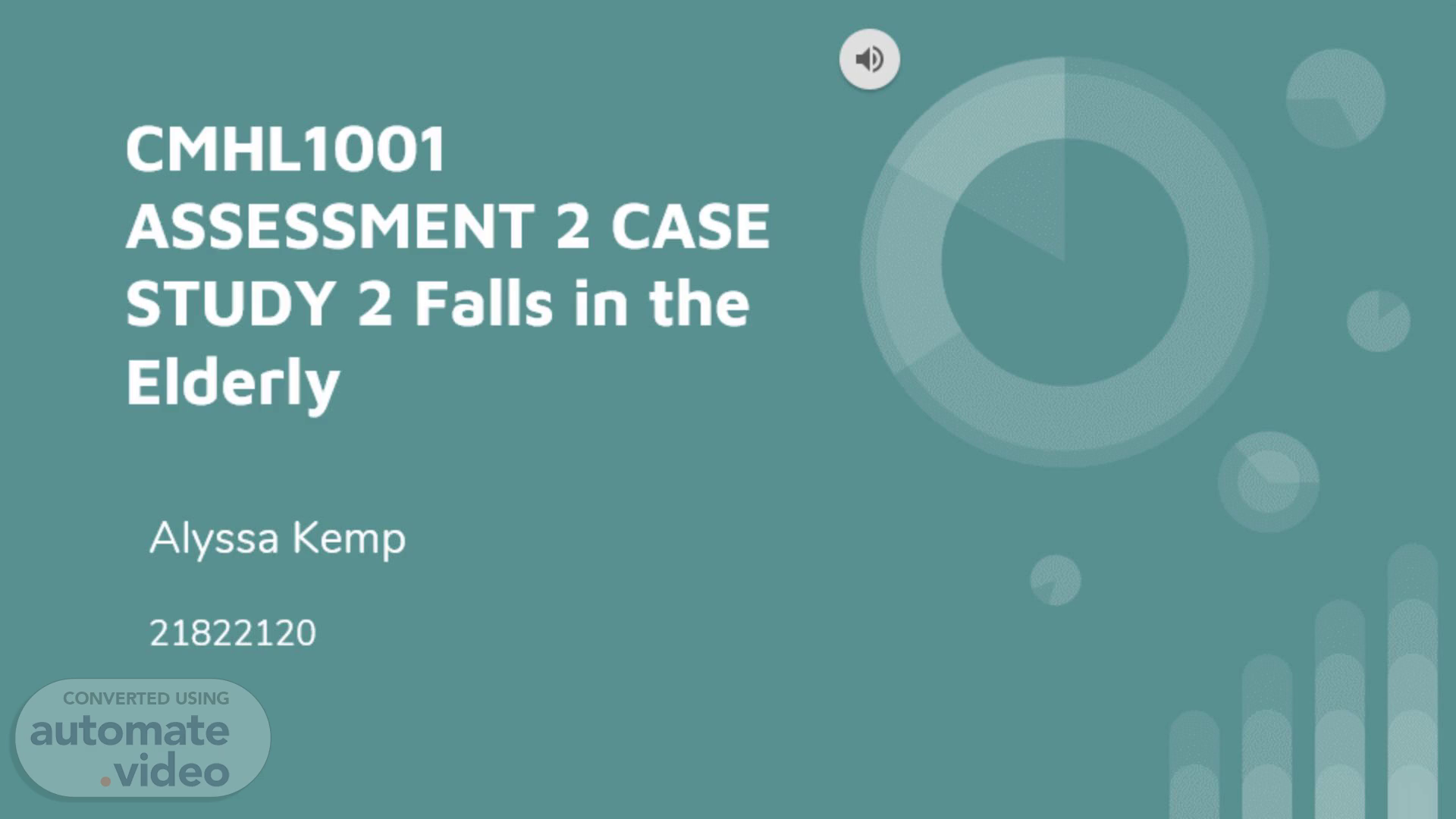
CMHL1001 ASSESSMENT 2 CASE STUDY 2 Falls in the Elderly
Scene 1 (0s)
CMHL1001 ASSESSMENT 2 CASE STUDY 2 Falls in the Elderly.
Scene 2 (7s)
Introduction to the study. This clinical trial was conducted over 12 months from April 2009 until June 2018, these randomized, single-blind clinical trials contained adults over the age of 70 who had experienced a fall within the last 12 months. Participants were selected from a falls prevention clinic. The purpose of this study is to assess whether a home based strength and balance retraining program is an effective method of fall prevention in the study group. This trial was conducted by randomizing patients to receive either usual care, provided by a geriatrician, or usual care plus home-based strength and balance retaining provided by a physical therapist for 12 months. This trial is perfect for Carlos, who meets all trial criteria, as a 76 year old who has had a fall in the last 12 months and wants to gain more confidence in his walking and strength. After the trial was completed the results concluded that amongst older adults who are receiving care at a fall prevention clinic, participating in a home-based strength and balancing retraining program greatly reduced the rate of recurring falls compared to people only receiving usual care. Participating in the retraining program had fall incidence rates at 1.4 compared to 2.1 in people receiving usual care only. No adverse events due to the intervention were recorded..
Scene 3 (1m 4s)
Potential bias in the study. Allocation Bias Participants were allocated on a random 1:1 ratio to be in either the intervention group or usual care group. Randomisation was also stratified by gender as fall rates between men and women vary. Central Internet randomisation services were used to ensure concealment of treatment allocations. Inclusion criteria treatment groups were as similar as possible at baseline. The criteria included physical testing, mental testing, patients history and life expectancy. This trial has a low risk of allocation bias as all participants are selected using the same exclusion/inclusion criteria and both groups received the usual standard of falls care regardless of which group they were placed in..
Scene 4 (1m 49s)
Potential bias in the study. Detection bias The assessors that measure outcomes at 6 and 12 months were blind to treatment assignment. All participants regardless of assignment were assessed using the same scales and tests by medical professionals familiar with these scales. This leaves a low risk of detection bias as all participants were assessed using the same tests..
Scene 5 (2m 25s)
Application of qualitative evidence to person featured in case study.
Scene 6 (2m 59s)
Person-centred care plan. For Carlos to receive a good person-centered care plan, there are several things that need to be considered. For Carlos the most important thing is that he can return to his old daily activities as closely as possible, while taking into account his new situation. If Carlos was to participate in a home-based exercise program to assist in reaching that goal, it would need to be supported by both his geriatrician, the treating physical therapist and his partner/family. His expectations for the outcomes would need to be managed realistically, participation in this program would need to be an ongoing commitment to reap the benefits but also allow him time to actually participate in the things he is wanting to get back to. Open communication about his expectations and his commitment to this avenue of treatment would need to be achieved from all treating parties involved for best results. Carlos’ geriatrician would also consider whether he would benefit from additional health care services. Carlos could benefit from seeing an occupational therapist to help with his struggles around the house with his ADL’s, as realistically there may be things that he will continue to struggle with even after participating in the program, this can help him to adjust things around the house to help him. Some form of mental health care or community groups/activities, may help Carlos with his lose of purpose he is currently experiencing. Having his family/pet involved in the care process can also be of great benefit, as everyone is on the same page with the treatment and outcome. Carlos’ geriatrician would also benefit from seeking out additional information regarding Carlos to help make their management plan person centered. Carlos' daily routine and the time he has to commit to the program will make a big difference in the outcome of the program, as well as how supportive his family and friends are. Finding out more about Carlos’ hobbies or passion can help his geriatrician to find suitable activities that would be helpful yet rewarding for Carlos..
Scene 7 (4m 5s)
Main considerations, recommendations and a desired trajectory..